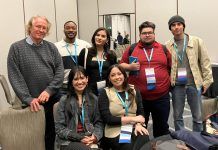
As federal immigration raids recently made national headlines, South Bay residents gathered to educate themselves on immigration law and how to protect themselves.
Together nonprofits Community Through Hope, Love Thy Neighbor Movement and People’s Legal Services created three clinics to educate the predominantly Latino community.
Attorneys from People’s Legal Services gave presentations on July 18 addressing California family law and on Aug. 22 addressing immigration law.
For the upcoming “Record Review and Expungement” clinic on Sep. 19 on C Street in Chula Vista, attorneys will give a presentation on what can be expunged from a record, the steps to expungement, and expungement rights.
The presentations are not available online, but Director of People’s Legal Services Anthony Medina said they should be on the People’s Legal Service’s website by the beginning of next year.
People’s Legal Services is a sliding scale nonprofit law firm, meaning that fees are based on gross income and family size, Medina said.
Medina was born and raised in Chula Vista to a father who worked as a union carpenter and a mother who worked in an aeronautical fabrication plant. He said his middle-class, blue-collar background and the opportunity as the first in his family to attend college and law school, inspired him to give back to his community.
Almost a year and a half ago People’s Legal Services was started as a way to create access to justice and partners with organizations like Community Through Hope and Love Thy Neighbor Movement to provide it in spaces where people can feel comfortable, Medina said.
The idea for the clinics came from the needs of the demographic and families of South Bay, founder of Love Thy Neighbor Ruben Torres said.
The South Bay is more than 70 percent Hispanic, and more than 34 percent of the population is foreign born, according to the latest 2016 demographic report from County of San Diego Health and Human Services Agency.
Although not many people showed up to the first clinic on family law, Torres said about 16 people showed up for the clinic on immigration law and there is already growing interest in the criminal law clinic on Sep. 19.
The overall feedback of the clinics so far is that they are needed in the community, Executive Director of Community Through Hope Rosy Vasquez said.
“We know that it is needed,” Vasquez said. “It was well attended, and we need more.”
Many of the people who attended the clinics either wanted to become U.S. citizens, wanted more information on U.S. Immigration and Customs Enforcement raids, were a part of the migrant caravan and were released without knowing where to go or who to talk to, or were standing in for someone who is undocumented, Torres said.
Love Thy Neighbor was founded in 2010 after one of Torres’ friends was deported to Tijuana, Mexico and wanted to help kids in his neighborhood by donating sports equipment.
After Torres and his brother brought a basketball from San Diego to Tijuana to donate to the neighborhood kids, he said it planted the seed to try and get more donations.
It was 10 years ago that Torres started a Facebook drive to donate toys to kids in Tijuana, which eventually led to his nonprofit that now helps the community through food drives, assisting the formerly incarcerated, and providing information on immigration issues.
Torres, like those who attended the clinics, is also currently on the path to becoming a U.S. citizen.
“Knowing how much I needed [help], I know there is other people and families that need it just as much,” Torres said.
The clinics were also important in making sure people were receiving the correct information regarding immigration law and their status, both Torres and Vasquez said.
“Right now with the political climate we want to make sure individuals feel supported and are also getting the proper information to move forward in their immigration process,” Vasquez said.
Torres said a sense of false fear has also been implanted in some people because of misinformation.
“’Dreamers’ and the undocumented community has been bolder … a little more outspoken,” Torres said. “At the same time there has been a lot of misinformation, so those that are here let’s give them the correct information.”
CORRECTION: A previous version of this story incorrectly stated Anthony Medina’s mother worked at a nautical fabric plant. She was employed at an aeronautical fabrication plant. The Star-News regrets the error.














